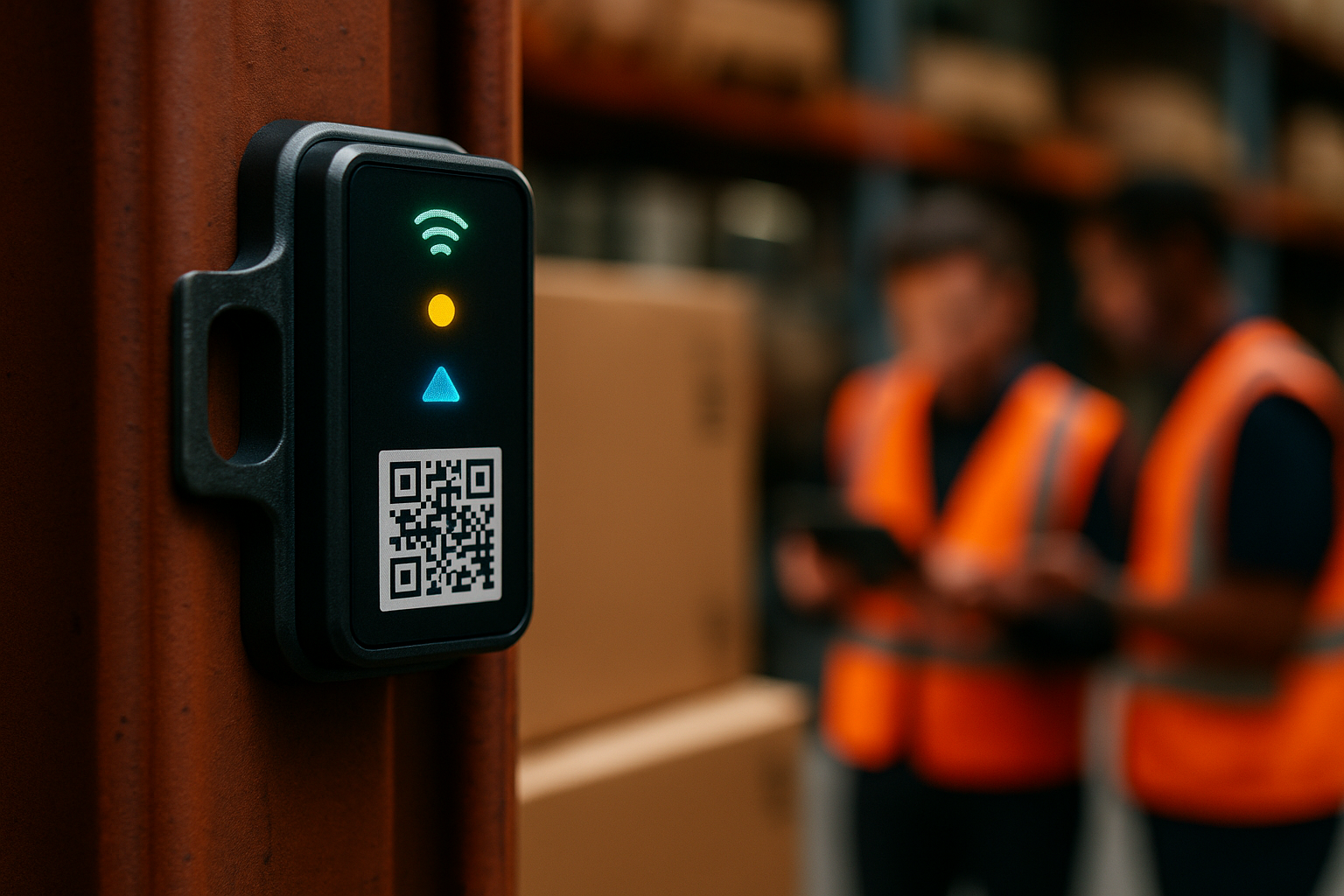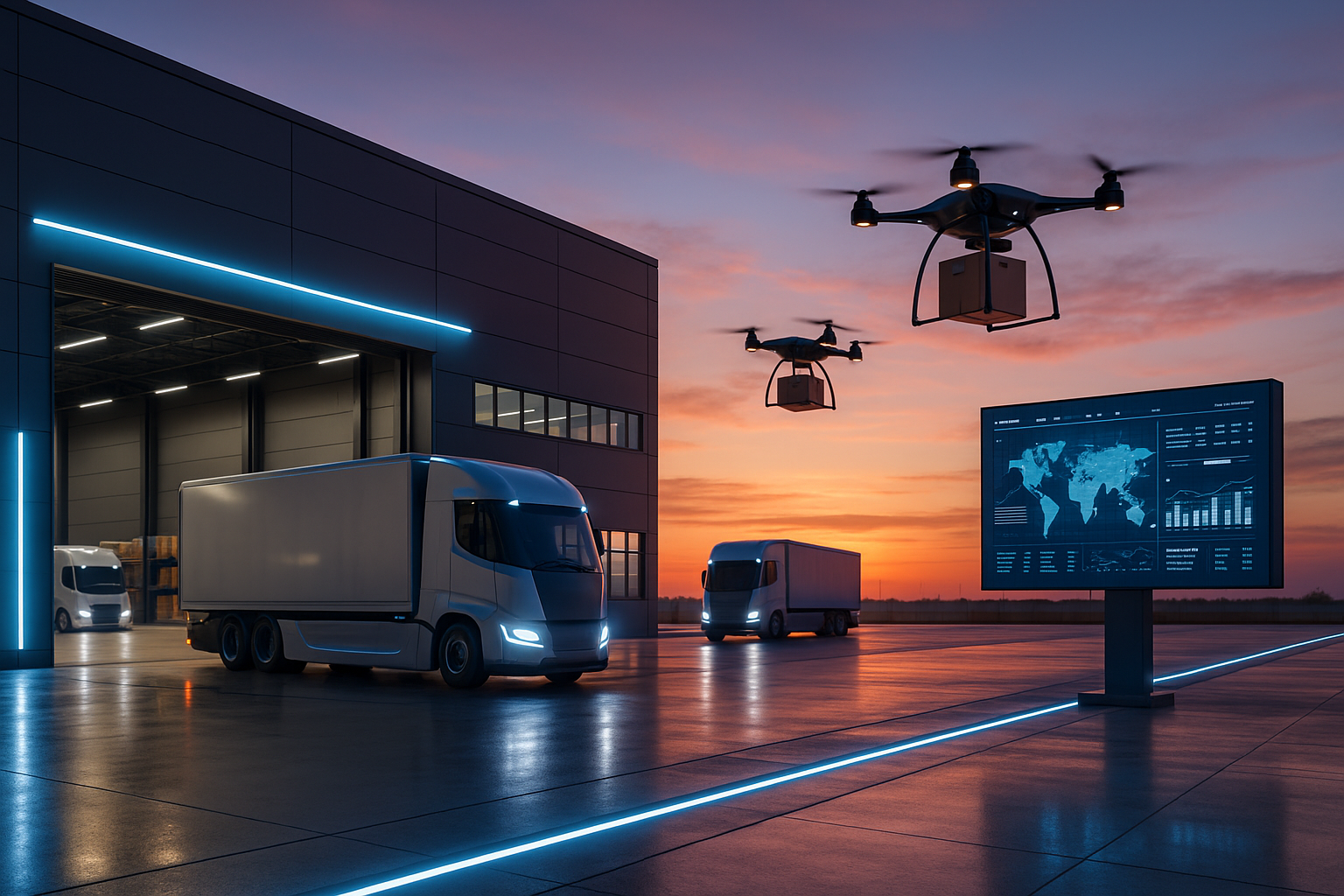The global supply chain is undergoing a monumental shift, and freight technology is at the forefront of this transformation.
As the world becomes more interconnected and consumers demand faster, more reliable deliveries, the way goods are transported, tracked, and managed has changed dramatically. From advanced software solutions to automated systems, technology is creating smarter, more efficient supply chains that can cope with the complexities of modern commerce.

In this article, we’ll explore how freight technology is revolutionising supply chains and what this means for logistics professionals, businesses, and consumers alike. We’ll delve into the key technologies, trends, and innovations that are shaping the future of freight and how freight people are adapting to these changes.
Let's Get Straight To The Point
Freight technology is transforming global supply chains by improving efficiency, transparency, and customer satisfaction. Key technologies like AI, IoT, blockchain, and automation are revolutionising how goods are tracked, managed, and delivered.
AI optimises routes and forecasts demand, IoT provides real-time shipment tracking, and blockchain ensures secure data exchange. These innovations enhance route planning, reduce costs, improve visibility, and support environmental sustainability.
As autonomous vehicles and AI-blockchain integration grow, the future of freight looks more efficient and customer-focused, with businesses benefiting from reduced operational costs and better performance.
The Rise of Freight Technology in the Supply Chain
Freight and logistics have always been at the heart of global trade, but as e-commerce, globalisation, and customer expectations have evolved, so too have the technologies that support these systems. Tech-driven logistics harnesses advanced technologies, including Artificial Intelligence (AI), Internet of Things (IoT), cloud computing, and blockchain, to improve everything from transportation management to warehouse operations.
Digital Transformation In Freight
The digital transformation of the freight industry is one of the most significant shifts in modern logistics. Companies are increasingly adopting digital platforms that integrate real-time data, automate processes, and provide predictive analytics. This enables freight people to make smarter decisions and react more quickly to market demands.
Digital platforms are being used to track and manage shipments, allowing for greater visibility in the supply chain. This allows businesses to optimise their logistics operations, reduce delays, and improve customer satisfaction.
The Role Of Ai And Automation In Freight Technology
Artificial Intelligence (AI) is becoming a game-changer in the freight industry. AI-powered algorithms are now able to analyse vast amounts of data in real-time, helping freight people predict shipment delays, optimise routes, and forecast demand more accurately.
Automation is also making its way into warehouses and distribution centres, with robots, drones, and autonomous vehicles handling the movement of goods. These innovations are reducing human error, increasing speed, and cutting costs, all of which contribute to a more efficient supply chain.
Key Technologies Transforming Freight and Logistics
Artificial Intelligence (Ai) And Machine Learning (Ml)
AI and machine learning (ML) are revolutionising how freight people plan, manage, and track shipments. AI-powered tools can predict issues before they occur, such as traffic disruptions or delays at ports. By analysing historical data, AI algorithms can offer recommendations for improving delivery times and optimising routes.
For example, AI is being used to predict demand for specific products in different regions, allowing businesses to adjust their inventory and supply chain logistics accordingly. This ability to forecast demand with greater accuracy is helping companies save on storage costs and reduce overstocking.
Machine learning is also enhancing the way freight companies monitor performance. By tracking patterns in the movement of goods, these systems can continuously improve their efficiency, learning from past experiences to make smarter decisions.
Internet Of Things (Iot)

The Internet of Things (IoT) refers to the network of connected devices that can collect and exchange data. In the context of freight, IoT sensors are embedded in cargo, containers, trucks, and warehouses to provide real-time updates on the location, condition, and status of shipments.
IoT technology allows businesses to monitor the temperature, humidity, and other conditions of sensitive cargo, such as pharmaceuticals or perishable goods, during transit. This level of visibility ensures that goods arrive in optimal condition and provides real-time alerts if there are any deviations from the required conditions.
By enabling freight people to track shipments in real-time, IoT technology helps prevent losses, reduce theft, and improve the overall security of supply chains.
Blockchain Technology
Blockchain, the underlying technology behind cryptocurrencies like Bitcoin, is also making a significant impact on freight and logistics. It is being used to create secure, transparent, and tamper-proof records of transactions, shipments, and contracts.
For freight companies, blockchain is providing a more secure way to exchange data between various stakeholders in the supply chain. This ensures that all parties have access to the same information, reducing the risk of fraud, errors, or disputes. Moreover, blockchain can streamline payment processes, eliminating the need for intermediaries and speeding up transactions.
For businesses and freight people, this means greater trust in the supply chain, faster payments, and more accurate tracking of goods from origin to destination.
The Impact of Freight Technology on Supply Chain Efficiency
Optimising Route Planning And Reducing Costs
One of the most impactful ways in which freight technology is revolutionising supply chains is through optimised route planning. AI and big data analytics enable companies to plan the most efficient routes for their shipments, taking into account factors such as traffic, weather conditions, and delivery windows.
By optimising routes, companies can reduce fuel consumption, shorten delivery times, and improve the overall efficiency of their operations. These savings can be passed on to consumers in the form of lower prices, which benefits everyone in the supply chain.
Additionally, freight people can access real-time data on shipment progress, which enables them to make quick adjustments if a route is delayed or disrupted. This leads to a more flexible and resilient supply chain that is better equipped to handle unexpected challenges.
Enhancing Supply Chain Visibility
Visibility is one of the biggest challenges in modern supply chains. Businesses often struggle to get a clear picture of where their goods are at any given time, leading to inefficiencies, delays, and poor customer experiences.
Freight technology is changing this by providing end-to-end visibility across the entire supply chain. With real-time tracking, businesses can monitor shipments, track inventory levels, and anticipate potential disruptions before they occur. This enhanced visibility also allows businesses to make data-driven decisions, improving inventory management and reducing stockouts.
For freight people, better visibility means they can proactively address issues and improve the customer experience. Real-time tracking information allows businesses to keep customers informed about the status of their orders, which builds trust and enhances customer satisfaction.
The Benefits of Freight Technology for Businesses and Consumers
Improved Customer Experience
In today’s competitive market, customers expect fast, reliable deliveries. Freight technology is helping companies meet these expectations by improving delivery speed, accuracy, and visibility. With predictive analytics and optimised routing, businesses can offer more reliable delivery estimates, reducing the chances of delays and enhancing customer satisfaction.
Additionally, technologies like IoT and blockchain provide greater transparency, allowing customers to track their shipments in real time. This empowers consumers by giving them more control over their orders, increasing their trust in the company and its services.
Reduced Environmental Impact
Another significant benefit of freight technology is its potential to reduce the environmental impact of logistics operations. With route optimisation, companies can reduce fuel consumption, leading to fewer emissions and a smaller carbon footprint. AI-powered systems also enable more efficient use of warehouse space, reducing the need for excessive packaging and transportation.
Moreover, the rise of electric and autonomous vehicles powered by AI and IoT is expected to further reduce the environmental impact of freight transport. These innovations are transforming the freight industry into a more sustainable, environmentally-friendly sector.
Cost Reduction And Increased Profitability
By improving efficiency, reducing delays, and optimising resources, freight technology is helping businesses cut costs and increase profitability. For example, automated warehouses and AI-driven route optimisation can significantly reduce operational costs, such as labour and fuel expenses.
Additionally, by improving the accuracy of demand forecasting, businesses can reduce waste and avoid overstocking. This helps companies optimise their supply chain operations, improve cash flow, and boost their bottom line.

The Future of Freight Technology and Supply Chains
The Rise Of Autonomous Freight
The future of freight technology looks set to include the widespread adoption of autonomous vehicles, including trucks and drones. These self-driving vehicles are expected to reduce the need for human drivers, increase safety, and improve delivery times.
Autonomous vehicles will also play a key role in reducing transportation costs. As the technology matures, it is likely that freight companies will see a reduction in labour costs and greater efficiency in their operations.
The Integration Of Artificial Intelligence And Blockchain
As AI and blockchain technologies continue to evolve, we can expect even more integration between these systems in the future. For instance, AI and machine learning algorithms could be used to validate transactions on the blockchain in real time, ensuring the integrity of the supply chain and preventing fraud.
The integration of AI and blockchain will also lead to more accurate, real-time tracking, enabling companies to improve everything from inventory management to order fulfilment.
Conclusion

The transformation of freight technology is reshaping the logistics industry in profound ways. With advancements in AI, IoT, blockchain, and automation, the supply chain is becoming more efficient, transparent, and customer-focused. As businesses and freight people embrace these technologies, they can look forward to improved operational efficiency, reduced costs, and better customer satisfaction.
As we move into the future, the role of freight technology will only continue to grow. With the right innovations, tomorrow's supply chain will be faster, more sustainable, and more responsive to the ever-changing demands of the global market.
FAQs
How Does Freight Technology Reduce Environmental Impact?
Freight technology helps reduce environmental impact by optimising routes, which decreases fuel consumption and emissions. AI and automation can also make warehouses more efficient, reducing waste. Moreover, the rise of electric and autonomous vehicles will contribute to even lower carbon footprints in freight transportation.
What Are Autonomous Vehicles, And How Will They Impact Freight?
Autonomous vehicles, including trucks and drones, are self-driving vehicles that will play a major role in transforming freight logistics. They will reduce the need for human drivers, increase safety, lower labour costs, and improve delivery times. Autonomous vehicles are expected to enhance the efficiency of freight operations and reduce transportation costs.
What Are The Challenges Of Adopting Freight Technology?
Some challenges of adopting freight technology include:
High initial investment: Advanced technologies like AI, IoT, and automation require significant capital.
Integration complexity: Integrating new technologies into existing systems can be complex and time-consuming.
Cybersecurity risks: With increased digitalisation, there is a risk of data breaches or cyber-attacks that could compromise sensitive supply chain information.
How Does Freight Technology Improve Supply Chain Visibility?
Freight technology improves visibility by providing real-time data on shipments, inventory levels, and potential disruptions. Tools like digital platforms, IoT sensors, and tracking systems allow businesses to monitor the entire supply chain from start to finish, making it easier to anticipate problems and keep customers informed about their orders.
What Is The Future Of Freight Technology?
The future of freight technology includes greater use of autonomous vehicles, AI-driven systems, blockchain integration, and enhanced automation. As these technologies evolve, we can expect more streamlined, efficient, and sustainable supply chains that offer faster deliveries, reduced costs, and improved customer experiences. The continued integration of AI and blockchain will lead to even more transparent, secure, and efficient freight operations.

